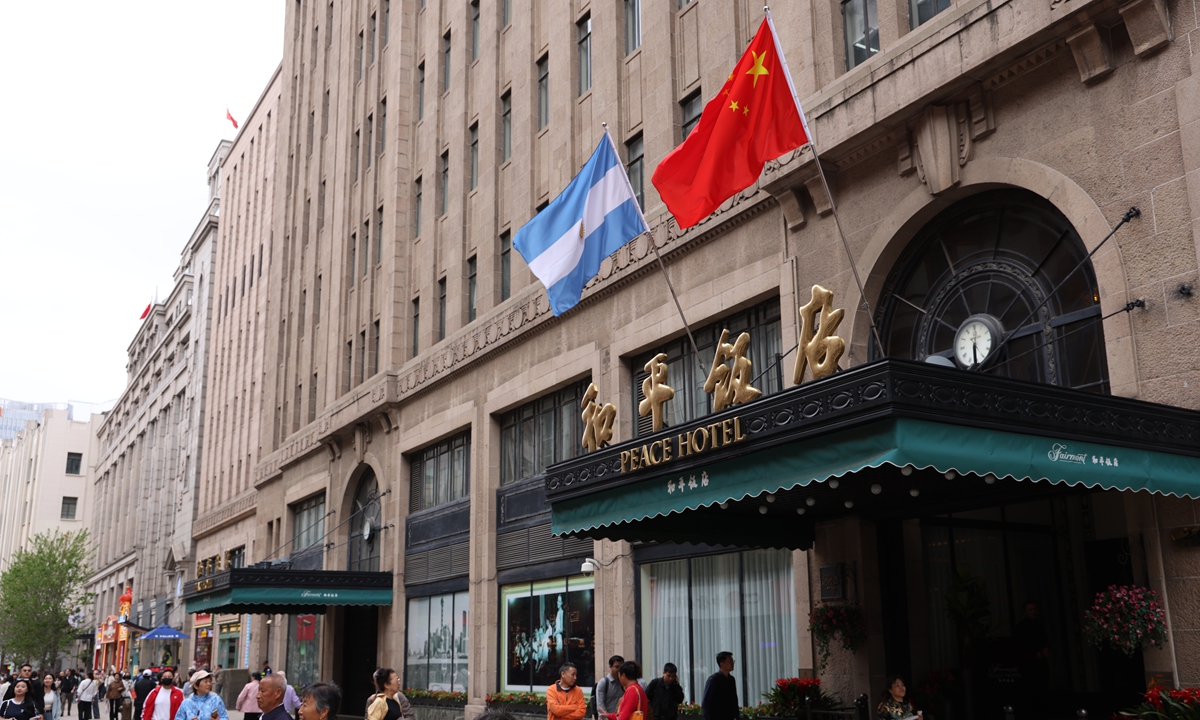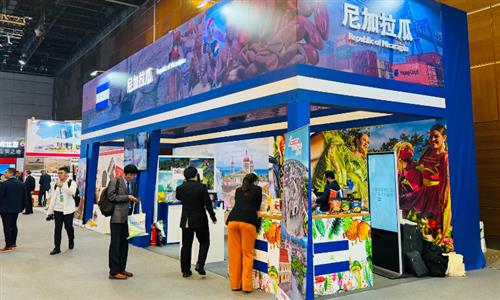China-Ecuador FTA to take effect on May 1 amid high-level Latin American diplomatic visits
Latin American FM visits show confidence in China

Pedestrians walk past the Peace Hotel in Shanghai as the national flags of China and Argentina were hoisted on April 27, 2024. Photo: VCG
The free trade agreement (FTA) between China and Ecuador will become effective from May 1, China's Ministry of Commerce (MOFCOM) said on Monday. The move comes as China welcomes foreign ministers from Argentina, Bolivia and Peru as relationship between China and Latin American countries deepens.
Experts said that the deepened trade ties between China and Latin American countries show a clear economic complementarity between the two sides, which has strong sustainability and is less vulnerable to global economic and geopolitical factors.
China and Ecuador will cancel tariffs on 90 percent of tax items from each other in phases, of which about 60 percent will be canceled immediately after the agreement comes into effect, the MOFCOM said.
It means that most products from China entering the Ecuadorian market, such as plastic products, chemical fibers, steel products, machinery, electrical equipment, furniture, automobiles and parts, lithium batteries, will see import tariffs gradually reduced from the current 5 to 40 percent to zero. Similarly, Ecuadorian products like bananas, shrimp, fish, fish oil, fresh and dried flowers, cocoa, and coffee entering the Chinese market will also see import tariffs gradually reduced from the current 5 to 20 percent to zero.
"China has been making significant progress in advancing free trade negotiations in Latin America in recent years, including with Ecuador and it showcases a clear economic complementarity between the two sides," Zhou Zhiwei, an expert in Latin American studies at the Chinese Academy of Social Sciences told the Global Times.
Ecuador's agricultural and seafood products to China are expected to see significant boost once the FTA comes into effect, Zhou said.
The recent visits of several Latin American foreign ministers to China also reflect the positive trend of cooperation between China and Latin American countries and the complementarity of both sides in the economic field which "has strong sustainability and is less vulnerable to global economic and geopolitical factors," Zhou noted.
Argentina's Minister of Foreign Affairs, International Trade, and Worship, Diana Mondino, is visiting China from Saturday to May 1.
In addition, Minister of Foreign Affairs of Bolivia Celinda Sosa Lunda and Minister of Foreign Affairs of Peru Javier González-Olaechea Franco are also visiting China from April 28 to 30.
There are extensive prospects for cooperation between China and Argentina in the fields of new energy, with Argentina being a country rich in lithium resources, Jiang Shixue, a professor at the Center for Latin American Studies at Shanghai University, told the Global Times on Monday.
According to public information, China is Argentina's second largest trading partner, accounting for 13.8 percent of Argentina's total foreign trade. China is also Argentina's third largest export market and second largest source of imports. Chinese direct investment in Argentina is mainly focused on infrastructure, energy, and the new-energy industry.
Advancing in areas such as energy transition and agricultural cooperation is essential to support Argentina's key industries, Zhou said.
In terms of new-energy cooperation, the maturity of Chinese technology, coupled with predictable investments, is crucial for countries like Argentina to achieve sustainable economic growth, Zhou added.
The active communication and exchanges between China and Latin American countries also showed their confidence in China's market and economic growth, experts said.
As Latin American countries are intensively seeking cooperation with Asia-Pacific countries, the importance of China in the Asia-Pacific region is undeniable when considering market demand and investment availability, Zhou said.
China's trade with Latin American countries expanded 8.3 percent year-on-year in the first three months of 2024 to reach $120.63 billion, according to data from Chinese Customs.



